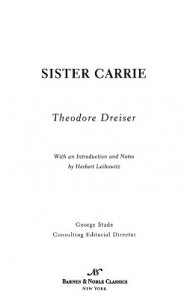Jennie Gerhardt - Драйзер Теодор (книги бесплатно без онлайн .txt) 📗
watering-place, but Mrs. Gerhardt wouldn't go. "I don't think it would do any good," she said. She sat about or went driving with her daughter, but the fading autumn scenery depressed her. "I don't like to get sick in the fall," she said. "The leaves coming down make me think I am never going to get well."
"Oh, ma, how you talk!" said Jennie; but she felt frightened, nevertheless.
How much the average home depends upon the mother was seen when it
was feared the end was near. Bass, who had thought of getting married
and getting out of this atmosphere, abandoned the idea temporarily.
Gerhardt, shocked and greatly depressed, hung about like one expectant
of and greatly awed by the possibility of disaster. Jennie, too
inexperienced in death to feel that she could possibly lose her mother, felt as if somehow her living depended on her. Hoping in spite of all opposing circumstances, she hung about, a white figure of patience, waiting and
serving.
The end came one morning after a month of illness and several days of
unconsciousness, during which silence reigned in the house and all the
family went about on tiptoe. Mrs. Gerhardt passed away with her dying
gaze fastened on Jennie's face for the last few minutes of consciousness
that life vouchsafed her. Jennie stared into her eyes with a yearning
horror. "Oh, mamma! mamma!" she cried. "Oh, no, no!"
Gerhardt came running in from the yard, and, throwing himself down by
the bedside, wrung his bony hands in anguish. "I should have gone first!"
he cried. "I should have gone first!"
The death of Mrs. Gerhardt hastened the final breaking up of the family.
Bass was bent on getting married at once, having had a girl in town for
some time. Martha, whose views of life had broadened and hardened, was
anxious to get out also. She felt that a sort of stigma attached to the home
—to herself, in fact, so long as she remained there. Martha looked to the public schools as a source of income; she was going to be a teacher.
Gerhardt alone scarcely knew which way to turn. He was again at work as
a night watchman. Jennie found him crying one day alone in the kitchen,
and immediately burst into tears herself. "Now, papa!" she pleaded, "it isn't as bad as that. You will always have a home— you know that—as
long as I have anything. You can come with me."
"No, no," he protested. He really did not want to go with her. "It isn't that," he continued. "My whole life comes to nothing."
It was some little time before Bass, George and Martha finally left, but, one by one, they got out, leaving Jennie, her father, Veronica, and
William, and one other—Jennie's child. Of course Lester knew nothing of
Vesta's parentage, and curiously enough he had never seen the little girl.
During the short periods in which he deigned to visit the house—two or
three days at most—Mrs. Gerhardt took care that Vesta was kept in the
background. There was a playroom on the top floor, and also a bedroom
there, and concealment was easy. Lester rarely left his rooms, he even had his meals served to him in what might have been called the living- room
of the suite. He was not at all inquisitive or anxious to meet any one of the other members of the family. He was perfectly willing to shake hands
with them or to exchange a few perfunctory words, but perfunctory words
only. It was generally understood that the child must not appear, and so it did not.
There is an inexplicable sympathy between old age and childhood, an
affinity which is as lovely as it is pathetic. During that first year in Lorrie Street, when no one was looking, Gerhardt often carried Vesta about on
his shoulders and pinched her soft, red cheeks. When she got old enough
to walk he it was who, with a towel fastened securely under her arms, led her patiently around the room until she was able to take a few steps of her own accord. When she actually reached the point where she could walk
he was the one who coaxed her to the effort, shyly, grimly, but always
lovingly. By some strange leading of fate this stigma on his family's
honour, this blotch on conventional morality, had twined its helpless baby fingers about the tendons of his heart. He loved this little outcast ardently, hopefully. She was the one bright ray in a narrow, gloomy life, and
Gerhardt early took upon himself the responsibility of her education in
religious matters. Was it not he who had insisted that the infant should be baptised?
"Say, 'Our Father,'" he used to demand of the lisping infant when he had her alone with him.
"'Ow Fowvaw,'" was her vowel-like interpretation of his words.
"'Who art in heaven.'"
"'OOh ah in aven,'" repeated the child.
"Why do you teach her so early?" pleaded Mrs. Gerhardt, overhearing the little one's struggles with stubborn consonants and vowels.
"Because I want she should learn the Christian faith," returned Gerhardt determinedly. "She ought to know her prayers. If she don't begin now she never will know them."
Mrs. Gerhardt smiled. Many of her husband's religious idiosyncrasies
were amusing to her. At the same time she liked to see this sympathetic
interest he was taking in the child's upbringing. If he were only not so
hard, so narrow at times. He made himself a torment to himself and to
every one else.
On the earliest bright morning of returning spring he was wont to take her for her first little journeys in the world. "Come, now," he would say, "we will go for a little walk."
"Walk," chirped Vesta.
"Yes, walk," echoed Gerhardt.
Mrs. Gerhardt would fasten on one of her little hoods, for in these days
Jennie kept Vesta's wardrobe beautifully replete. Taking her by the hand, Gerhardt would issue forth, satisfied to drag first one foot and then the other in order to accommodate his gait to her toddling steps.
One beautiful May day, when Vesta was four years old, they started on
one of their walks. Everywhere nature was budding and bourgeoning; the
birds twittering their arrival from the south; the insects making the best of their brief span of life. Sparrows chirped in the road; robins strutted upon the grass; bluebirds built in the eaves of the cottages. Gerhardt took a
keen delight in pointing out the wonders of nature to Vesta, and she was
quick to respond. Every new sight and sound interested her.
"Ooh!—ooh!" exclaimed Vesta, catching sight of a low, flashing touch of red as a robin lighted upon a twig nearby. Her hand was up, and her eyes
were wide open.
"Yes," said Gerhardt, as happy as if he himself had but newly discovered this marvellous creature. "Robin. Bird. Robin. Say robin."
"Wobin," said Vesta.
"Yes, robin," he answered. "It is going to look for a worm now. We will see if we cannot find its nest. I think I saw a nest in one of these trees."
He plodded peacefully on, seeking to rediscover an old abandoned nest
that he had observed on a former walk. "Here it is," he said at last, coming to a small and leafless tree, in which a winter- beaten remnant of a home was still clinging. "Here, come now, see," and he lifted the baby up at arm's length.
"See," said Gerhardt, indicating the wisp of dead grasses with his free hand, "nest. That is a bird's nest. See!"
"Ooh!" repeated Vesta, imitating his pointing finger with one of her own.




